Top Rankings
Farwell Independent School District ranks among the top 20% of public school district in Texas for:
Category
Attribute
Overall Rank
Highest overall rank (Top 10%)
Math Proficiency
Highest math proficiency (Top 10%)
Reading/Language Arts Proficiency
Highest reading/language arts proficiency (Top 20%)
Student Attention
Lowest student:teacher ratio (Top 1%)
For the 2025 school year, there are 3 public schools serving 605 students in Farwell Independent School District. This district's average testing ranking is 10/10, which is in the top 10% of public schools in Texas.
Public Schools in Farwell Independent School District have an average math proficiency score of 66% (versus the Texas public school average of 41%), and reading proficiency score of 65% (versus the 51% statewide average).
Minority enrollment is 56% of the student body (majority Hispanic), which is less than the Texas public school average of 75% (majority Hispanic).
Overview
This School District
This State (TX)
# Schools
3 Schools
9,320 Schools
# Students
605 Students
5,529,984 Students
# Teachers
63 Teachers
374,844 Teachers
Student : Teacher Ratio
10:1
10:1
District Rank
Farwell Independent School District, which is ranked #102 of all 1,196 school districts in Texas (based off of combined math and reading proficiency testing data) for the 2021-2022 school year.
The school district's graduation rate of 90% has stayed relatively flat over five school years.
Overall District Rank
#105 out of 1204 school districts
(Top 10%)
(Top 10%)
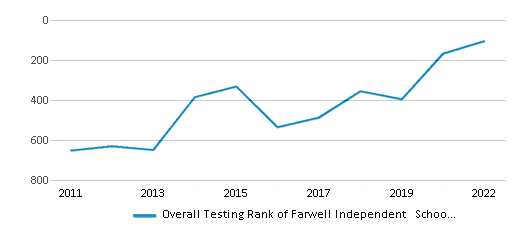
Math Test Scores (% Proficient)
66%
41%
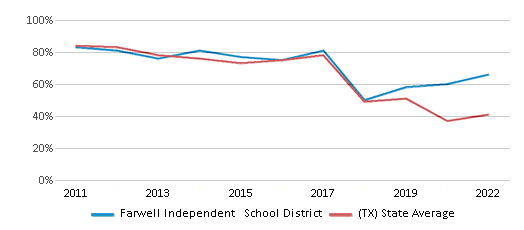
Reading/Language Arts Test Scores (% Proficient)
65%
51%
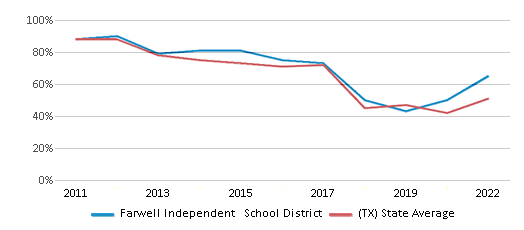
Science Test Scores (% Proficient)
50-54%
46%
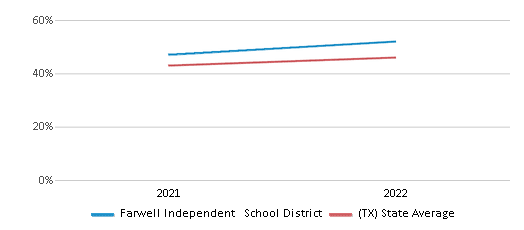
Graduation Rate
≥90%
90%
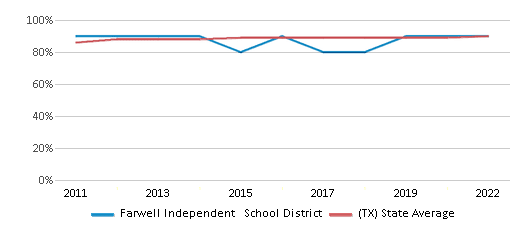
Students by Ethnicity:
Diversity Score
0.51
0.64
# American Indian Students
n/a
17,916 Students
% American Indian Students
n/a
n/a
# Asian Students
1 Student
296,049 Students
% Asian Students
n/a
6%
# Hispanic Students
334 Students
2,942,422 Students
% Hispanic Students
55%
53%
# Black Students
1 Student
706,008 Students
% Black Students
n/a
13%
# White Students
264 Students
1,384,941 Students
% White Students
44%
25%
# Hawaiian Students
n/a
8,841 Students
% Hawaiian Students
n/a
n/a
# Two or more races Students
5 Students
173,807 Students
% of Two or more races Students
1%
3%
Students by Grade:
# Students in PK Grade:
21
275,832
# Students in K Grade:
50
361,958
# Students in 1st Grade:
49
385,427
# Students in 2nd Grade:
50
402,148
# Students in 3rd Grade:
37
399,623
# Students in 4th Grade:
43
398,690
# Students in 5th Grade:
37
399,071
# Students in 6th Grade:
48
402,143
# Students in 7th Grade:
43
406,424
# Students in 8th Grade:
55
414,179
# Students in 9th Grade:
52
472,263
# Students in 10th Grade:
44
438,622
# Students in 11th Grade:
36
406,207
# Students in 12th Grade:
40
367,397
# Ungraded Students:
-
-
District Revenue and Spending
The revenue/student of $14,555 is higher than the state median of $13,387. The school district revenue/student has declined by 10% over four school years.
The school district's spending/student of $14,112 is less than the state median of $14,116. The school district spending/student has declined by 10% over four school years.
Total Revenue
$9 MM
$74,029 MM
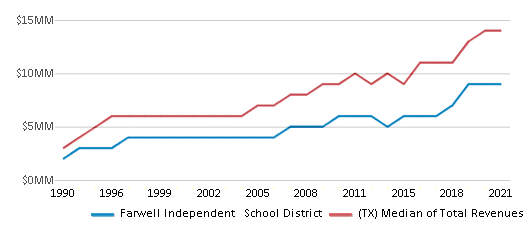
Spending
$9 MM
$78,063 MM
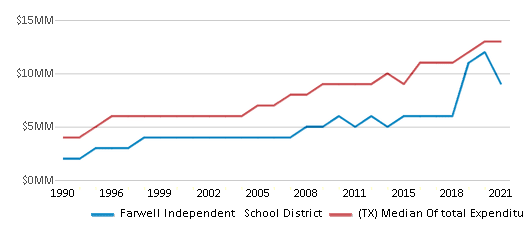
Revenue / Student
$14,555
$13,387
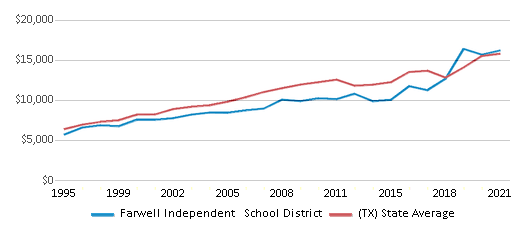
Spending / Student
$14,112
$14,116
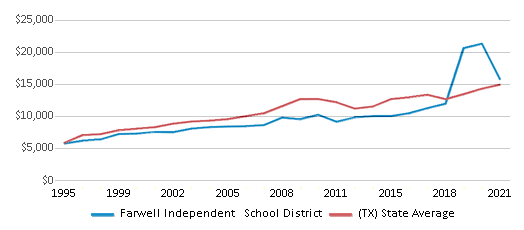
Best Farwell Independent School District Public Schools (2025)
School
(Math and Reading Proficiency)
(Math and Reading Proficiency)
Location
Grades
Students
Rank: #11.
Farwell Elementary School
(Math: 75-79% | Reading: 75-79%)
Rank:
Rank:
10/
Top 5%10
601 Ave G
Farwell, TX 79325
(806) 481-9131
Farwell, TX 79325
(806) 481-9131
Grades: PK-5
| 287 students
Rank: #22.
Farwell J High School
(Math: 60-64% | Reading: 60-64%)
Rank:
Rank:
9/
Top 20%10
701 Ave G
Farwell, TX 79325
(806) 481-9260
Farwell, TX 79325
(806) 481-9260
Grades: 6-8
| 146 students
Rank: #33.
Farwell High School
(Math: 40-49% | Reading: 40-49%)
Rank:
Rank:
5/
Bottom 50%10
801 Ave G
Farwell, TX 79325
(806) 481-3351
Farwell, TX 79325
(806) 481-3351
Grades: 9-12
| 172 students
Frequently Asked Questions
How many schools belong to Farwell Independent School District?
Farwell Independent School District manages 3 public schools serving 605 students.
What is the rank of Farwell Independent School District?
Farwell Independent School District is ranked #102 out of 1,196 school districts in Texas (top 10%) based off of combined math and reading proficiency testing data for the 2021-2022 school year. This district ranks in the top 20% of Texas school districts for: Highest overall rank (Top 10%), Highest math proficiency (Top 10%), Highest reading/language arts proficiency (Top 20%) and Lowest student:teacher ratio (Top 1%)
What is the racial composition of students in Farwell Independent School District?
55% of Farwell Independent School District students are Hispanic, 44% of students are White, and 1% of students are Two or more races.
What is the student/teacher ratio of Farwell Independent School District?
Farwell Independent School District has a student/teacher ratio of 10:1, which is lower than the Texas state average of 15:1.
What is Farwell Independent School District's spending/student ratio?
The school district's spending/student of $14,112 is less than the state median of $14,116. The school district spending/student has declined by 10% over four school years.
Recent Articles

Year-Round Or Traditional Schedule?
Which is more appropriate for your child? A year-round attendance schedule or traditional schedule? We look at the pros and cons.

Why You Should Encourage Your Child to Join a Sports Team
Participating in team sports has a great many benefits for children, there is no doubt. In this article you will learn what those benefits are.

White Students are Now the Minority in U.S. Public Schools
Increasing birth rates among immigrant families from Asia and Central and South America, combined with lower birth rates among white families, means that for the first time in history, public school students in the United States are majority-minority. This shift in demographics poses difficulties for schools as they work to accommodate children of varying language abilities and socio-economic backgrounds.





